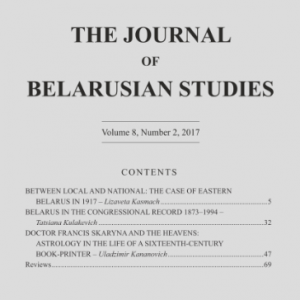The Journal of Belarusian Studies: Eastern Belarus in 1917, Congressional Record, Skaryna’s astrology

The Ostrogorski Centre in cooperation with the Anglo-Belarusian Society is pleased to present the newest issue of the Journal of Belarusian Studies.
Established in 1965, the Journal is oldest periodical on Belarusian Studies in the English language.
Between Local and National: the Case of Eastern Belarus in 1917
The 2017 issue of the Journal begins with an article authored by Lizaveta Kasmach. Her recently completed PhD, written at the University of Alberta in Canada, deals with the Belarusian nation-building in the context of the First World War and Revolution. Her article here analyses the challenges of national mobilisation of Belarusians in eastern Belarus in 1917. At that time the February Revolution in Russia opened up new opportunities for national activists to engage in politics.
Lizaveta highlights two key obstacles which prevented activists from succeeding: the legacy of decades of Russifi cation and the local (rather than national) identity of the Belarusian population. During that period, people were avoiding clear-cut national identities and instead identifying themselves with a certain region or settlement. In accordance with people’s strategies for survival, they did not imagine themselves as members of a separate Belarusian nation.

Belarus in the Congressional Record 1873–1994
Tatsiana Kulakevich from Rutgers University analyses Belarus in Congressional Record between 1873 and 1994. The author highlights the importance of diaspora activities in the United States, which helped to place Belarus on the world map in the minds of the American political elite. From a voiceless territory under Russian influence Belarus became a separate country suffering from Communism and deserving the right to national independence.
Doctor Francis Skaryna and the Heavens: Astrology in the Life of a Sixteenth-Century Book-Printer
Uladzimir Kananovich writes about Francis Skaryna, one of the first East European book printers, who laid the groundwork for the development of the Belarusian language. Although the profi le of Skaryna has been analysed in the literature, his interest in astrology has not been properly explored. Francis Skaryna was also a medical practitioner with a keen interest in astrological prognostication.
The appearance of the symbol of a sun charged with a crescent moon in his most famous engravings may be attributed to Regiomontanus’s influence on Skaryna as well. The article of Uladzimir Kananovich resulted from his presentation at the second annual conference of Belarusian Studies which took place in London in March 2017. The conference was organised by the Ostrogorski Centre in cooperation with University College London and the Belarusian Francis Skaryna Library and Museum.

Speakers from Belarus, the United Kingdom, Japan, Germany, the United States and other countries presented and discussed Belarus-related research. The conference panels covered Francis Skaryna’s work and legacy, problems of Belarusian national identity, the foreign policy of Belarus and comparative politics, social and political movements, and Belarusian language and literature.
The main conference was followed by the Annual Lecture on Belarusian Studies, delivered last year by Dr Ales Susha, deputy director of the National Library of Belarus and chairman of the International Association of Belarusian Language and Culture Specialists. The annual lecture, as well as podcasts of all conference panels, can be found online on Soundcloud.
Reviews
Siarhei Bohdan from Berlin discusses a book on Soviet Belarusisation, trying to distill myths from reality. Aliaksiej Lastoūski from Minsk reviews a book published in Polish on how Belarus is viewed in the European context from the philosophical point of view. Roman Urbanowicz from Budapest looks at a book on informal cross-border trade and gender issues.
This issue of the Journal of Belarusian Studies also includes the annual report of the Anglo-Belarusian Society prepared by its chairman and former British ambassador to Belarus Brian Bennett.
The journal accepts submissions on a rolling basis and welcomes contributions from younger and established academics on all aspects of Belarusian studies.







